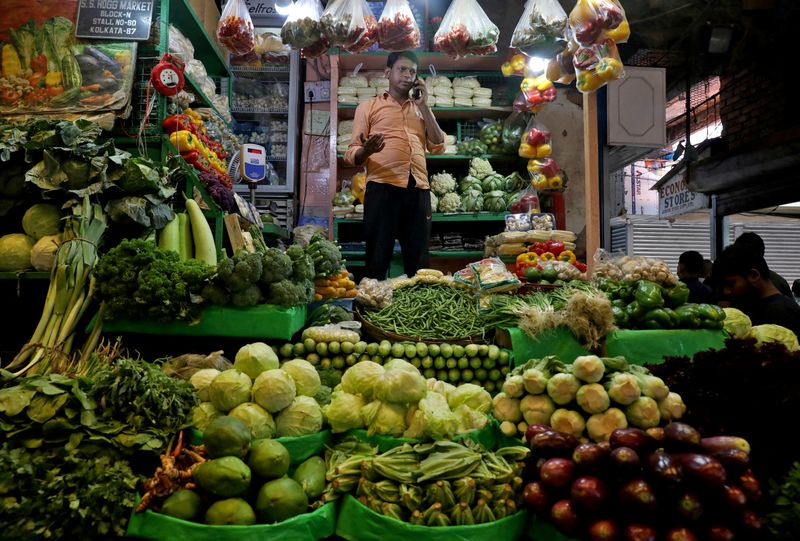[ad_1]
By Vivek Mishra
BENGALURU (Reuters) – Forecasts for a light slowdown in India’s fast-growing economic system held regular within the first Reuters ballot of economists for the reason that ruling Bharatiya Janata Occasion (BJP) misplaced its parliamentary majority in phased nationwide elections that led to early June.
Asia’s third-largest economic system grew 8.2% within the final fiscal yr, the quickest amongst main economies. However development is ready to gradual to 7.0% after which 6.7% within the present and subsequent fiscal years, in accordance with a June 19-27 Reuters ballot of over 50 economists.
The forecasts are broadly unchanged from these made earlier than the end result of an election Prime Minister Narendra Modi was extensively anticipated to win simply. As an alternative, the BJP misplaced its sizeable parliamentary majority for its historic third time period.
Forming a authorities with the help of regional events, the BJP retained most ministers, suggesting no imminent shift in coverage, which for years has aimed to spice up gross home product (GDP) development by means of authorities capital spending.
However and not using a follow-through in personal expenditure, many Indians – significantly younger individuals – have been ignored of labor or in low-paying jobs. With no main change to coverage anticipated but, economists left their forecasts regular.
“With a diminished majority now, I do not anticipate any main growth-enhancing reforms in any way over the following 5 years,” stated Miguel Chanco, chief rising Asia economist at Pantheon Macroeconomics.
“The fact is (that) consumption is weak. It is simply going to floor extra within the GDP numbers as a result of the elevate from statistical discrepancies is fading.”
India’s financial development within the three months by means of December was a lot larger than most estimates as a consequence of a pointy fall in key subsidies which offered a lift to GDP – a scenario economists within the ballot say is unlikely to recur.
The median 7.0% development charge anticipated this fiscal yr within the newest ballot is barely under the Reserve Financial institution of India’s (RBI) personal forecast of seven.2%, which Governor Shaktikanta Das lately stated might enhance additional in coming months.
“Progress is switching to a decrease gear however will stay near potential. I’ve baked in a modest personal capex cycle pickup, not maybe as sturdy because the RBI is factoring. And consumption (will) carry out higher however I do not suppose it is going to turn into a development driver,” stated Dhiraj Nim, economist at ANZ.
Most economists anticipate the federal government to keep up a broad path of fiscal consolidation, however use a bumper dividend switch from the RBI final month for larger spending in a finances more likely to be offered in late July.
“The federal government has for years centered on infrastructure…, and that has barely come at the price of consumption. So I consider the finances can form of present some help, particularly on the decrease finish of the financial spectrum,” Nim stated.
The federal government is contemplating decreasing private tax charges to spice up consumption, two authorities sources advised Reuters.
Almost two-thirds of respondents within the ballot – 25 of 39 – stated the federal government is not going to considerably alter its deliberate spending in its first full finances in comparison with the interim one. The remaining stated it is going to improve.
“The federal government is unlikely to reverse its insurance policies regardless of receiving a lower-than-anticipated mandate. It (will) improve funding for employment assure schemes and create extra jobs by means of a producing push,” stated Sanya Suri, senior Asia economist at Continuum Economics.
“Nonetheless, the substantial surplus offered by the RBI and ongoing development in tax receipts will fund these initiatives.”

Inflation is just not anticipated to fall under the RBI’s medium-term goal of 4% anytime quickly – averaging 4.6% and 4.5% this fiscal yr and subsequent. However the RBI is predicted to chop rates of interest as soon as this yr, probably in October-December.
(For different tales from the Reuters world financial ballot:)
[ad_2]
Source link



